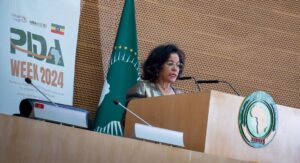PIDA initiatives have created 160,000 jobs in Africa

The Programme for Infrastructure Development in Africa (PIDA) a framework of the African Union operationalised by the African Union Development Agency NEPAD (AUDA NEPAD), has initiated a number of infrastructure projects across countries in Africa and those projects have created direct and indirect jobs.
Speaking at the opening of the PIDA Week 2024 in Addis Ababa, Ethiopia, Tuesday November 26, 2024, the CEO of AUDA NEPAD, Nardos Bekele-Thomas said programmes initiated by PIDA have created 160,000 direct and indirect jobs.
Citing the PIDA 10-Year Implementation Report, she said, over 30 million people have gained access to electricity.
She also indicated that road and rail infrastructure have been enhanced, and that has modestly increased intra-African trade, now accounting for 16% of total trade.
“In the water sector, critical storage infrastructure supports agriculture and trade, while broadband penetration has surpassed expectations, reaching over 25% and accelerating Africa’s digital transformation.
During project construction and operation, PIDA initiatives have created over 160,000 direct and indirect jobs, underscoring their impact on employment and livelihoods. These successes reflect the tangible benefits of PIDA’s efforts but also underscore the ongoing challenges we must address,” she said.
She added that, since its inception in 2015, PIDA Week has become a premier platform for infrastructure development on the continent.
“Organized jointly by the African Union, AUDA NEPAD, the African Development Bank, and UNECA, it serves as a vital space to evaluate progress, tackle challenges, and forge strategic partnerships. This year’s theme, ‘Fostering Resilient and Inclusive Infrastructure for Africa’s Sustainable Growth: Leveraging Transformative Financing and Regional Integration,’ reflects our commitment to addressing Africa’s pressing infrastructure needs,” she said.
She added that building upon the momentum of the 2022 Dakar Financing Summit and the 2023 launch of the PIDA First 10-Year Implementation Report in Nairobi, the meeting in Addis Ababa is to deliberate on solutions that will reshape the infrastructure landscape and advance the collective vision for the continent.
Amani Abou-Zeid, the AU Commissioner for Infrastructure and Energy said PIDA as a continental initiative spanning until 2040 and regarded as enabler of the AU Agenda 2063, aims to address infrastructure deficits across the continent.
“The Second Priority Plan of PIDA (PIDA PAP 2) leverages on an integrated corridor approach to maximise efficiency and synergy in crossborder infrastructure planning and construction, by fostering strategic collaboration among Regional Economic Communities (RECs) and African Union Member States, PIDA has been crucial in creating a framework that drives infrastructure development across Africa. A range of projects have been successfully implemented, enhancing road networks, boosting power generation and transmission, developing water supply systems, and expanding digital infrastructure,” she said.
She pointed out that through PIDA projects, nearly 30 million people in Africa have gained access to electricity, bringing the continent’s overall electricity access rate to approximately 44%.
“Since the start of PIDA, more than 16,000 kilometers of roads and 4,000 kilometers of railway lines have been developed across the continent. PIDA has also played a significant role in Africa’s digital transformation, with the augmenting number of countries achieving digital connectivity via optical fiber cables, exceeding the original goals,” she said.
Ms Abou-Zeid noted that only 3% of PIDA project funding has been sourced from the private sector, compared to 16-19% in other regions, which is a cause for concern.
“It is crucial that we examine the underlying reasons for this gap and explore potential solutions to boost private sector participation moving forward. It is important to deploy all the efforts required to mobilise further public resources,” she said, and reiterated that the AU Commission has been advocating for infrastructure financing to be and remain a political priority of the governments.
“Committing the relevant national budgets and offering credit guarantees to attract private capital are essential for the development of infrastructure priority projects across the continent,” she added.
In his remarks, the Executive Secretary of the Economic Commission for Africa (ECA) Dr CLaver Gatete said the theme of the event “Fostering Resilient and Inclusive Infrastructure for Africa’s Sustainable Growth: Leveraging Transformative Financing and Regional Integration” is relevant and timely, and aligns well with the United Nations’ drive towards sustainable infrastructure development.
“In 2023, the General Assembly declared the first ever United Nations Decade of Sustainable Transport to start in 2026 and called for the celebration of the next World Sustainable Transport Day on 26 November 2024 – which, coincidentally, is today. Within the framework of the celebration and as part of PIDA Week, ECA is organizing a session this afternoon that will focus on “digital transformation and the Global Decade on Sustainable Transport”. We are delighted to be the bridge between global and African infrastructure development aspirations and invite you all to attend the session,” he said.
Dr Gatete stated that infrastructure endowment (transport, energy, ICT, and water resources) has a direct impact on the cost of living and doing business in Africa, noting that inadequate infrastructure increases the continent’s production and transaction costs, which reduces its competitiveness in the global market.
“Africa’s infrastructure deficit lowers its per capita economic growth by 2% a year and reduces the productivity of its firms by as much as 40%. Infrastructure endowment is vital for industrialisation, trade, and regional integration. That is why ECA has prioritised infrastructure development over the years, he said, adding that PIDA provides a strategic framework for priority projects aimed at transforming Africa through the construction of modern infrastructure to strengthen the continent’s competitiveness and integration into the global economy.
By Emmanuel K Dogbevi, in Addis Ababa, Ethiopia
Copyright ©2024 by NewsBridge Africa
All rights reserved. This article or any portion thereof may not be reproduced or used in any manner whatsoever without the express written permission of the publisher except for the use of brief quotations in reviews.
